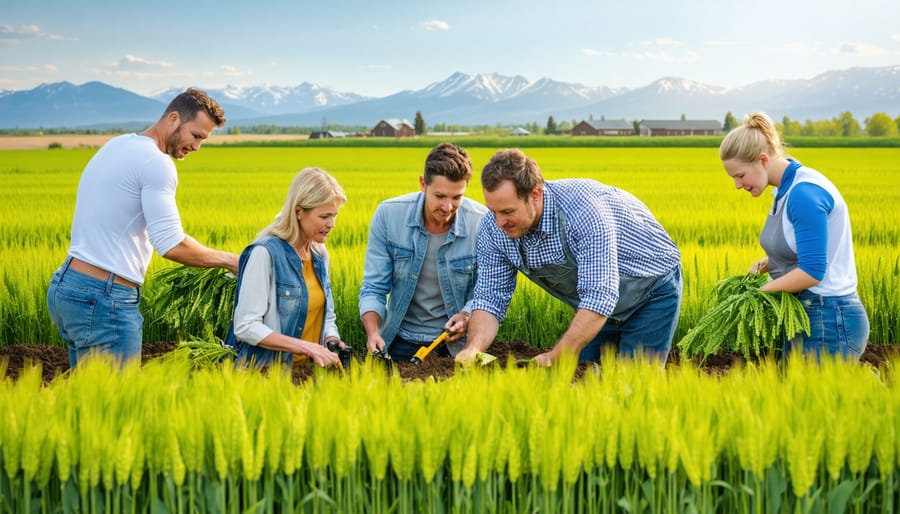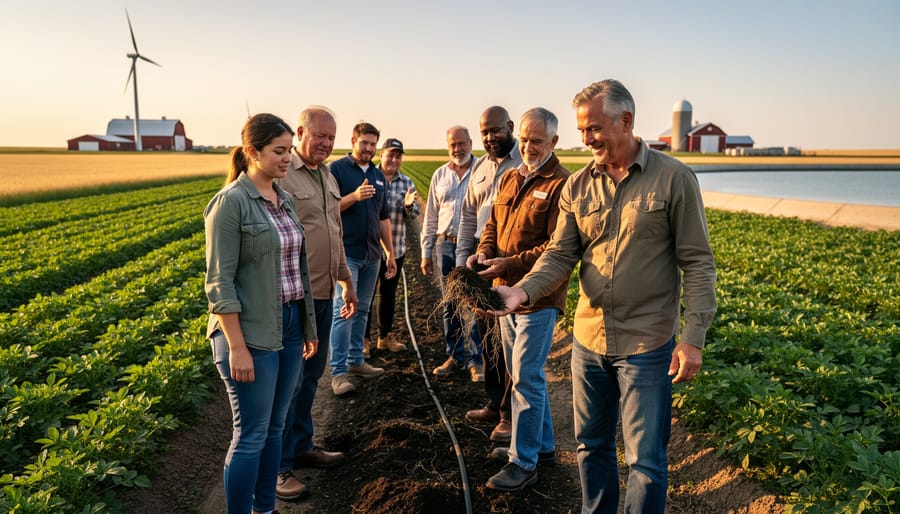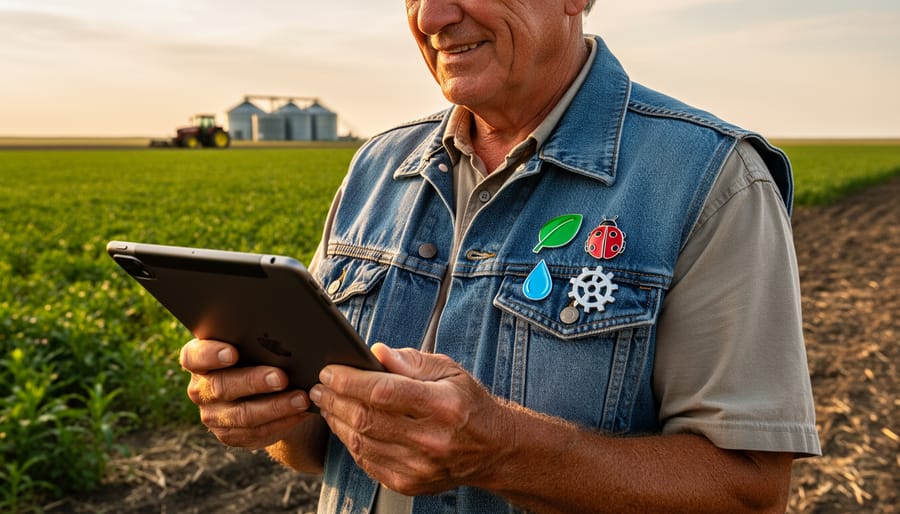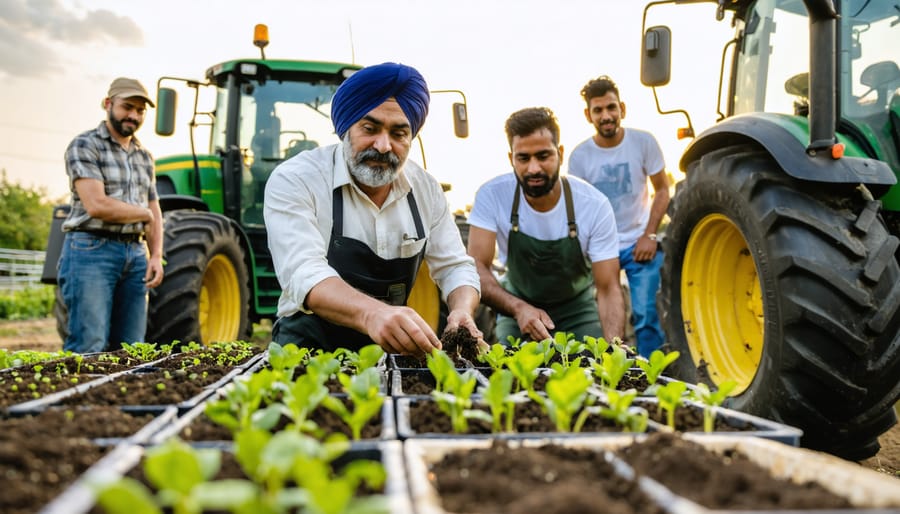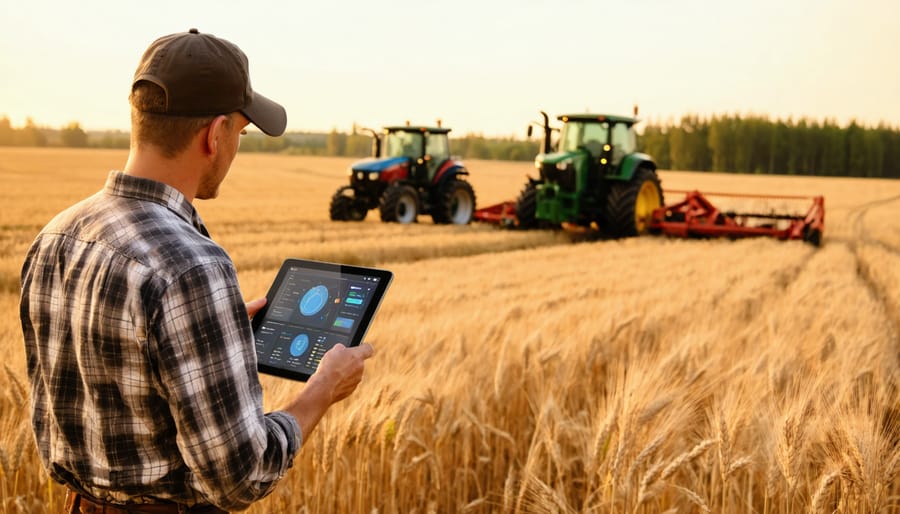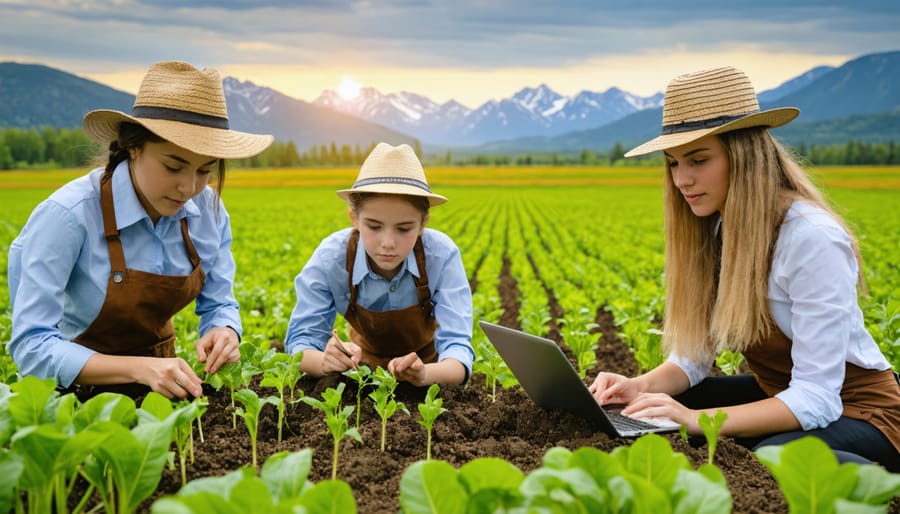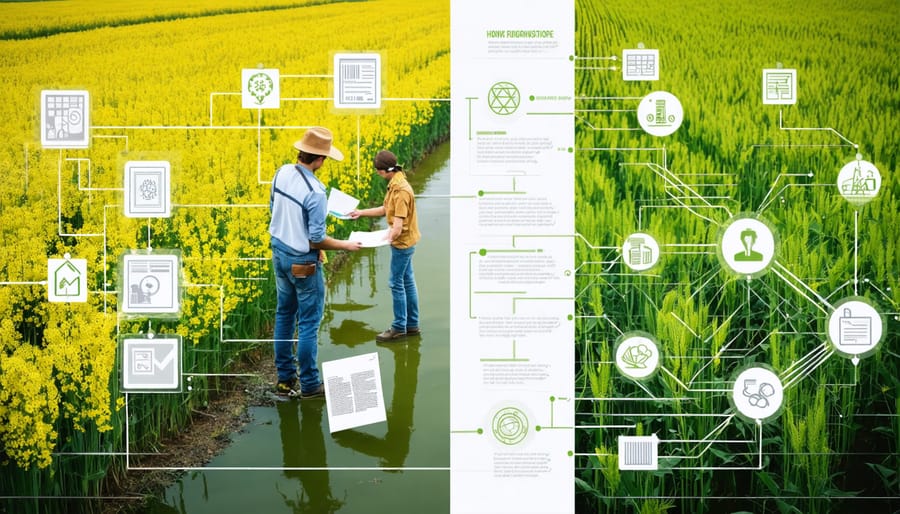Transform your farming knowledge into hands-on wisdom at Alberta’s leading agricultural workshops, where generations of expertise meet modern innovation. Step into sprawling wheat fields, state-of-the-art greenhouses, and heritage farms to experience agriculture firsthand through immersive learning programs designed for both seasoned farmers and curious newcomers.
These experiential workshops bridge the gap between traditional farming wisdom and cutting-edge sustainable practices, offering participants direct access to successful local producers and agricultural specialists. From soil management in the Prairie provinces to precision agriculture techniques adapted for Canadian growing conditions, each hands-on session delivers practical skills that participants can immediately apply to their own operations.
Getting your hands dirty isn’t just about learning—it’s about joining a vibrant community of forward-thinking agriculturalists who understand that the future of farming depends on sharing knowledge, embracing innovation, and maintaining our connection to the land. Whether you’re managing a multi-generational family farm or exploring agriculture as a new career path, experience-based learning provides the foundation for sustainable success in Canada’s evolving agricultural landscape.
The Power of Learning Through Experience
Why Traditional Training Falls Short
Traditional agricultural education often relies heavily on classroom learning and theoretical knowledge, which, while valuable, doesn’t fully prepare farmers for the complex realities of modern farming. Many Alberta farmers have found that textbook learning alone leaves significant gaps in practical skills and decision-making abilities needed for successful farm operations.
The fast-paced nature of agricultural advancement means that by the time traditional training materials are published, some information may already be outdated. Weather patterns, market conditions, and technology evolve rapidly, requiring farmers to adapt quickly and make real-time decisions that aren’t covered in conventional courses.
Moreover, standard training programs typically can’t replicate the nuanced challenges of different soil types, microclimates, and regional farming conditions across Alberta’s diverse agricultural landscape. They often miss the crucial networking opportunities and peer-to-peer learning that comes from hands-on experience.
Local farmers regularly report that some of their most valuable learning came not from textbooks but from handling actual farm challenges, working alongside experienced mentors, and participating in community knowledge-sharing. This highlights the need for more immersive, experience-based training approaches that better reflect real-world farming conditions.
The Hands-On Advantage
In agriculture, there’s no substitute for getting your hands dirty. Hands-on learning activities provide farmers with practical skills that classroom instruction alone simply cannot match. When you’re physically engaging with soil testing, operating equipment, or practicing grafting techniques, you’re developing muscle memory and intuitive understanding that stays with you long after the session ends.
Field-based learning allows you to experience real-world challenges and solutions in a supported environment. You’ll learn to identify plant diseases, understand soil composition through touch, and master equipment calibration through direct practice. This experiential approach also creates valuable opportunities to learn from mistakes without risking your own operation.
Moreover, practical learning sessions facilitate natural networking with fellow farmers. While working side by side in the field, you can share experiences, troubleshoot problems together, and build lasting connections within the agricultural community. These relationships often evolve into long-term support networks that prove invaluable during challenging growing seasons.
For new farmers especially, hands-on experience builds confidence and competence simultaneously, creating a solid foundation for successful farming operations.
Popular Workshop Formats in Alberta
Field Days and Demonstrations
In Alberta, field demonstrations have become cornerstone events for sharing agricultural innovation and best practices. The Lacombe Research Centre’s annual field day draws over 300 farmers each summer, showcasing new crop varieties and sustainable farming techniques. Participants get hands-on experience with soil testing methods and learn about crop rotation strategies that have helped local farmers increase yields by up to 20%.
The Medicine Hat Agricultural Society hosts monthly demonstrations focusing on precision agriculture technology. Their recent drone mapping workshop attracted farmers from across southern Alberta, demonstrating how aerial imaging can optimize irrigation and reduce water usage by 15-25%.
In Red Deer County, the “Farm to Field” program pairs experienced farmers with newcomers for seasonal demonstrations. Last year, participating farms reported significant improvements in their operational efficiency, with one dairy operation reducing feed costs by 12% after implementing techniques learned during these sessions.
The Peace Region’s Regenerative Agriculture Field Days have become particularly successful, featuring soil health workshops and grazing management demonstrations. Local farmer Sarah Thompson, who implemented methods learned at these events, noted: “These demonstrations showed us exactly how to transition to regenerative practices. We’ve seen remarkable improvements in our soil quality within just two growing seasons.”
These practical learning opportunities continue to strengthen Alberta’s agricultural community, fostering innovation and sustainable farming practices through direct experience and peer-to-peer learning.
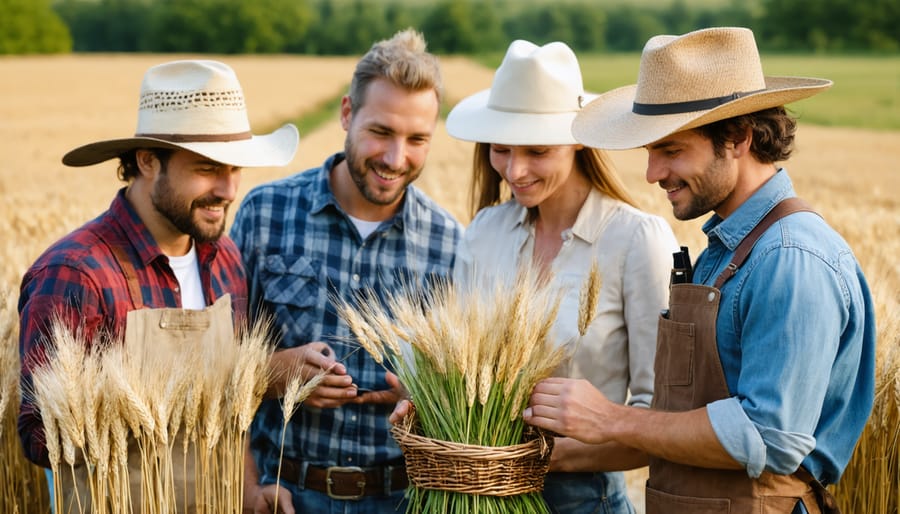
Peer-to-Peer Learning Sessions
Alberta’s farming community has embraced peer-to-peer learning as a cornerstone of agricultural education. The Millet County Farm Collective’s monthly workshops serve as a prime example, where experienced farmers share practical insights on everything from soil quality management to crop rotation strategies.
Third-generation farmer Sarah Thompson hosts regular field demonstrations at her 400-hectare farm near Red Deer, drawing crowds of 30-40 local farmers each session. Her workshops on regenerative agriculture practices have helped neighboring farms increase yields by an average of 15% while reducing input costs.
The Southern Alberta Grain Exchange’s mentorship program pairs veteran farmers with newcomers, facilitating knowledge transfer through hands-on experience. Program graduate Mike Henderson credits these sessions for his successful transition from conventional to organic farming methods, noting a 20% increase in profit margins within two years.
These farmer-led initiatives have proven particularly valuable during challenging seasons, with participants reporting stronger community bonds and improved resilience through shared problem-solving and resource optimization.
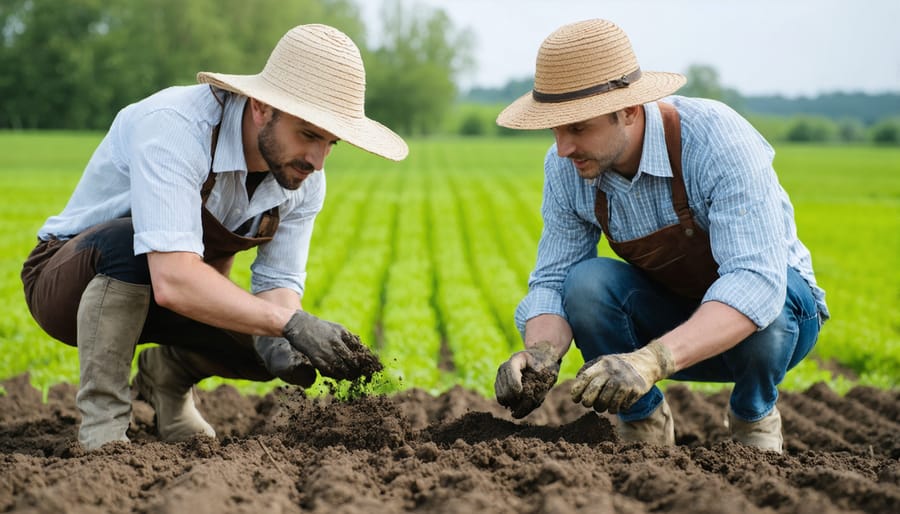
Expert-Led Technical Workshops
Our expert-led workshops bring together seasoned agricultural professionals and innovative farmers to share their knowledge and experience with the Alberta farming community. These intensive training sessions cover everything from soil health management to modern farming technologies, providing hands-on learning opportunities in real farm settings.
Participants work directly with industry specialists who have proven track records in sustainable agriculture. Each workshop is carefully designed to address specific challenges faced by Canadian farmers, with practical demonstrations and interactive problem-solving sessions. Whether you’re interested in precision agriculture, crop rotation strategies, or livestock management, our expert instructors provide personalized guidance and region-specific solutions.
These workshops typically run for one to three days, allowing for in-depth exploration of topics and plenty of time for questions and networking. Small group sizes ensure that every participant receives individual attention and can fully engage with the material. Many of our instructors are local success stories themselves, bringing valuable insights about farming in Alberta’s unique climate and soil conditions.
Success Stories from Alberta’s Fields
Small-Scale Success
The Johnson family farm in Lacombe County stands as a testament to the transformative power of experiential agriculture. Five years ago, Sarah and Mike Johnson were struggling to maintain their traditional 160-acre grain operation. After participating in several hands-on workshops focused on sustainable farming practices, they reimagined their entire approach to farming.
The Johnsons implemented a diversified crop rotation system and introduced heritage livestock breeds. They created educational programs for local schools and began hosting weekend workshops for aspiring farmers. Their revenue streams multiplied as they incorporated direct-to-consumer sales and agritourism activities.
Today, their farm generates 40% more income than it did five years ago, while using 30% less chemical inputs. The family hosts monthly skill-sharing sessions that attract farmers from across Alberta, teaching everything from soil health management to heritage seed saving.
“The key was moving beyond theoretical knowledge to hands-on experience,” explains Sarah. “When we started learning by doing and sharing that knowledge with others, everything changed. Our soil improved, our crops became more resilient, and we built a supportive community of like-minded farmers.”
The Johnsons’ success story demonstrates how experiential learning can transform a traditional farm into a thriving, multifaceted agricultural enterprise while strengthening local food systems.
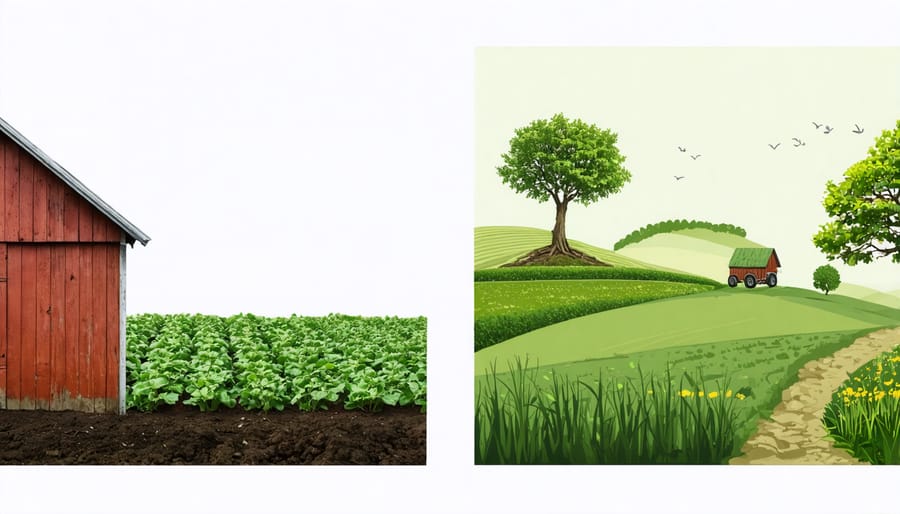
Large Operation Innovation
Sunward Farms, a 2,000-hectare operation near Red Deer, Alberta, exemplifies how larger agricultural enterprises can successfully implement experience-based learning principles. After attending several hands-on workshops, owners Mark and Sarah Thompson restructured their entire crop rotation system based on soil health principles they learned through practical demonstrations.
The Thompsons implemented a modified strip-tillage system across 75% of their operation, reducing fuel costs by 30% while maintaining yield targets. They credit their success to the hands-on experience gained during equipment calibration workshops, where they learned alongside other large-scale producers facing similar challenges.
Another success story comes from Prairie Vista Farms, operating 1,500 hectares near Lethbridge. Owner James McKenzie adapted precision agriculture techniques learned through experiential workshops to his specific landscape and soil conditions. By incorporating variable rate technology and GPS mapping skills acquired through hands-on training, McKenzie achieved a 15% reduction in input costs while improving soil organic matter levels.
These operations demonstrate that size is not a barrier to implementing workshop learnings. Both farms created internal training programs for their staff, effectively scaling the knowledge gained through workshops across their operations. They also regularly host field days, sharing their experiences with other farmers and contributing to the broader agricultural community’s knowledge base.
Making the Most of Agricultural Workshops
Preparation Tips
Getting the most out of your agricultural workshop experience starts with proper preparation. Pack weather-appropriate clothing, including sturdy boots, work gloves, and layers suitable for Alberta’s variable climate. Many participants find it helpful to bring a water bottle, sunscreen, and insect repellent during warmer months.
Bring a notepad and pen for taking notes, and consider using your smartphone or tablet for photo documentation and quick reference. If you have specific tools or equipment mentioned in the workshop description, pack those as well. However, most workshops provide specialized equipment needed for hands-on activities.
Before attending, review any pre-workshop materials provided and prepare relevant questions about your farming operation. This helps you maximize learning opportunities and makes discussions more productive. Consider your current challenges and goals to focus your attention on applicable solutions during the workshop.
For full-day sessions, pack a lunch and snacks unless meals are specifically included. Many workshops offer networking opportunities during breaks, so bring business cards if you have them. It’s also wise to bring a small first aid kit and any personal medications you might need.
Arrive at least 15 minutes early to complete registration and get oriented with the facility. This extra time allows you to meet other participants and settle in before the session begins. Remember, workshops are collaborative learning environments, so come with an open mind and ready to share your own experiences with fellow farmers.
Implementation Strategies
After completing your agricultural workshop, implementing new practices requires a structured approach. Start by reviewing your workshop notes and creating a detailed action plan within one week while the information is fresh. Break down larger concepts into manageable tasks that align with your farm’s current operations and seasonal schedule.
Begin with a small-scale trial of new techniques on a designated portion of your land. This approach allows you to test methods without risking your entire operation. For example, if you learned about regenerative grazing, start with one paddock before expanding to larger areas.
Document your implementation process through photographs and detailed notes. Track key metrics such as soil quality, yield rates, and resource usage to measure the effectiveness of new methods. This data will prove invaluable when deciding whether to scale up practices.
Connect with other workshop participants to form a support network. Many Alberta farmers find success through regular check-ins with peers who attended the same training. Consider organizing monthly meetups or creating an online group to share experiences and troubleshoot challenges together.
Don’t hesitate to reach out to workshop instructors for follow-up guidance. Most agricultural educators in Alberta are happy to provide additional support as you implement their teachings. Remember that adaptation is key – modify techniques to suit your specific climate, soil conditions, and operational needs while maintaining the core principles learned.
Experience-based agricultural learning has proven to be a cornerstone of modern farming success across Alberta and beyond. Through hands-on workshops and practical field training, farmers have discovered new ways to enhance their operations, improve sustainability, and build resilient agricultural businesses that stand the test of time.
The transformation we’ve witnessed in participants who embrace experiential learning speaks volumes about its effectiveness. From mastering precision farming techniques to implementing innovative soil conservation methods, these practical experiences have consistently delivered tangible results for Canadian farmers.
As we’ve explored throughout this article, the benefits of experience agriculture extend far beyond the immediate learning outcomes. These workshops create valuable networking opportunities, foster mentorship relationships, and build strong agricultural communities that support each other’s growth and success.
We encourage you to take the next step in your farming journey by participating in upcoming agricultural workshops in your area. Whether you’re a seasoned farmer looking to diversify your skills or new to the industry seeking foundational knowledge, there’s a program designed to meet your needs.
Contact your local agricultural extension office today to learn about upcoming workshops and hands-on learning opportunities. Join the growing community of forward-thinking Canadian farmers who are shaping the future of agriculture through experiential learning. Your next breakthrough in farming excellence might just be one workshop away.

